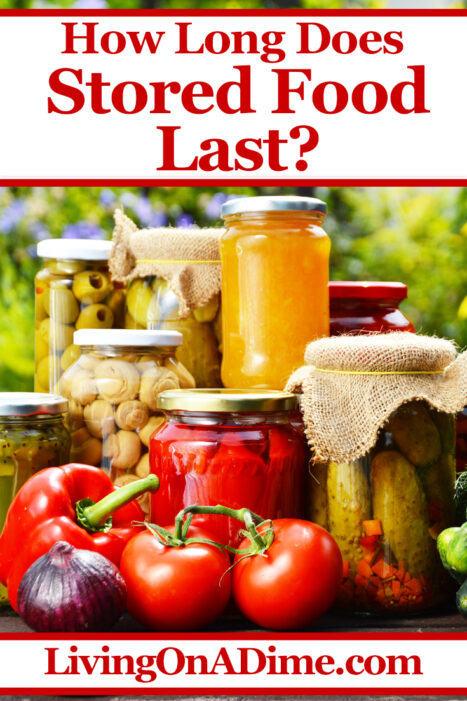Here’s a quick reference guide if you’re wondering how long does stored food last. We discuss the types of expiration dates, packaging and storage shelf life for common items like canned goods, eggs, milk, vegetables and more!

We recommend always keeping a supply of food on hand in case of emergencies, but also as a way to save a lot of money on your food bill. We often get the question, “How long does canned food last?” when people are considering a longer term stockpile.
We have experienced many emergencies that have disrupted life like tornadoes, floods, stay home orders and other things that may make it difficult to get items at the store, so we always like to keep enough food on had to last our family 6 months or more in case of a serious disaster.
Stockpiling and storing food is also a great way to save a lot on groceries, because you can buy items when they’re on sale for a very good price and then store enough of those items to have plenty when prices are not so good. I think of my food storage as my mini grocery store at home. Using this practice is how I never pay more than $1.99 a pound for ground beef, even though it may easily be $5.00 a pound at the store on any given day.
When storing food for a longer amount of time, it is important to rotate the food, using the older items first so that they do not go bad and then replacing them with newer items. It is also important to know how long stored foods last.
About Food Expiration Dates
One thing that is helpful to know when storing and stockpiling food is how to understand food expiration dates. When considering how long does canned food last, just because something is past its expiration date does not necessarily mean it is unusable. Here are some date types and what they mean:
Best By Date – The item will be ok to eat it past that date but will taste best and be freshest if used by this date.
Use By Date – It will be ok to eat it past that date but will taste best and be freshest used by this date.
Sell By – The store has to sell the product by that date but it is still good 3-4 days after that to use at home.
Spoiled food will usually look different in texture and color, smell unpleasant and taste bad before it becomes unsafe to eat.
How Long Do Foods Last? Canned Food, Eggs, Vegetables and More!
Here are approximately how long common foods last in the freezer, refrigerator or pantry:
Potatoes and Sweet Potatoes
Shelf life: 2 to 5 weeks
Store potatoes and sweet potatoes in a cool, dry, dark place.
Onions
Shelf life: 1 to 2 months
Store onions in a cool, dry, dark place for maximum longevity.
Peanuts in shell
Shelf life: 1 to 2 months
Winter squash – acorn, pumpkin, spaghetti, butternut
Shelf life: 1 to 3 months
Apples
Shelf life: 5 days at room temperature. 6 months in the refrigerator
Tea
Shelf life: 6 to 12 months past the “best by” date
Can last a few years in unopened packages but might lose some flavor.
Powdered milk
Shelf life: 2-3 years
Beef jerky
Shelf life: 1 to 2 years
Canned fruits and vegetables
Shelf life: 6-8 years past “best by” date
DO NOT USE canned goods if the cans are dented or have swollen tops, which may indicate the presence of harmful bacteria inside, like botulism.
Dried pasta
Shelf life: 2-4 years past the”best by” date
Bouillon cubes
Shelf life: 2 years if sealed
Peanut butter
Shelf life: 2 years
Milk Chocolate
Shelf life: 1 to 2 years
Dark chocolate
Shelf life: 2 to 5 years
Chocolate exposed to high temperatures can develop white spots, but these are harmless and don’t affect the flavor.
Canned or vacuum-pouched tuna
Shelf life: 3 to 5 years after “best by” date
Canned is best for long term storage.
Dried beans
Shelf life: Indefinite
Dried beans are pretty much indestructible if they’re kept dry, though they begin to lose their moisture after a year or two. As they age, they will require longer pre-soaking and/or cooking times to become tender.
Honey
Shelf life: Indefinite
Pure 100% undiluted honey in an unopened jar (stored away from heat) will still be edible years, decades even generations. If it crystallizes just warm until crystals dissolve and it will re-liquify.
Liquor
Shelf life: Indefinite
White rice
Shelf life: Indefinite
Brown rice
Shelf life: 6 months
White Flour
Shelf life: 6 months past Best Buy Date
Whole Wheat Flour
Shelf life: Use by Best Buy Date
Whole Wheat Flour goes bad more quickly than white flour.
Tiny black bugs among rice and flour. These are weevils or flour bugs, and they’ve either found their way into the package through microscopic openings or their eggs were harvested along with the rice and flour itself. If you have a problem with them in your area, freeze your flour or rice first for 24 hours and then store in dry, airtight containers.
Milk
Shelf life: 1 week past best buy date for fresh, 2-3 weeks past best buy date for sour milk
Pour a small amount into a small bowl and smell it. Does it smell vinegary or has it separated out into clumps? If it does, it’s probably spoiled. If it’s not clumpy or separated it’s just sour and can still be used for baking.
Nuts
Shelf life: 6 months in a cabinet, 1 year in the freezer
Eggs
Shelf life: 2-3 weeks past the “Sell By” date
Condiments & Dressings
Shelf life: 6 months past date
Click here to get our Dining On A Dime Cookbooks 25% Off NOW! They’re filled with tasty recipes and tips to make your life easier!







Thank you for this information. All of you have helped me so much with these great tips.
I’ve started dehydrating and tried beef jerky. It was very fatty, supersale hamburger and I stored the extra in the freezer. It was so yummy that we ate it quickly. I will use very lean meat for jerky next time.
In the books and info that I’ve read it encourages one to store in the freezer for longer term.
Birdie
I have a question about the white rice. I did not freeze first but put in a glass jar instead with a lid. (canning jar and lid) After a few days I opened the rice and it stunk – kind of sour smelling so I threw it. Then, I read where Minute Rice is actually just rice that has been cooked and dehydrated which is why it cooks up so quickly. I am thinking it may keep indefinitely. What do you think? Also, if you freeze rice and beans first, don’t they collect moisture on them that would be retained if you moved them to a jar after freezing?
If your refrigerator is set too cold and some things freeze then You can’t rely on the sink/float test for eggs. My frig partially froze my eggs and they floated. I was suspicious of that result. I took them outside and cracked them (so they wouldn’t stink up my house if they were rotten) and they were not bad at all
Great valuable information, some I knew and some I didn’t. Thank you.
how do you store dry beans for long term. Can you keep them in the original bag and put them in a plastic containers until needed? Or froze the beans first in original bag to kill any bugs that might be in there then store when beans are at room temperature. Thanks
Denise I have never frozen my beans to get rid of bugs but if you think you might have problems with them you could. I just would keep them in their original bag if you are storing them for 5 yrs or less. Longer you might want to leave in original bag and place in plastic containers. Things to consider on storing them are is in a place that could easily get mice or bugs then do the extra containers but as long as they are stored like in a place in the house and out of sun light you don’t need to worry as much. Also if you live in a humid climate you may have to do the extra container. Too anything long term for the moment you should be rotating out so that helps too.
Hi Ladies, I have a question. Would you know if canned food that I left in my unheated garage in winter temperatures are good? I brought them inside at some point because I was moving and now they are just sitting on my kitchen floor some a 1.5 year past expiration. Some cans have some visible surface rust and also include some containers of broth. I just don’t know how to address it and have been procrastinating because I don’t know if the food being exposed to extreme NY cold temperatures. Thank you so much.
Tracy to be safe you might just google it and see. It seems to be all over the place whether or not you can use them. I think though the main thing is if the can is bulging after it has been frozen it might not be good. But you might check it out that way. I hate to say for sure. Now I will say for years I have left can goods in the trunk of my car that was always parked outside all winter long in below freezing temps and would eat them with no problem but you still might google and see what you think.